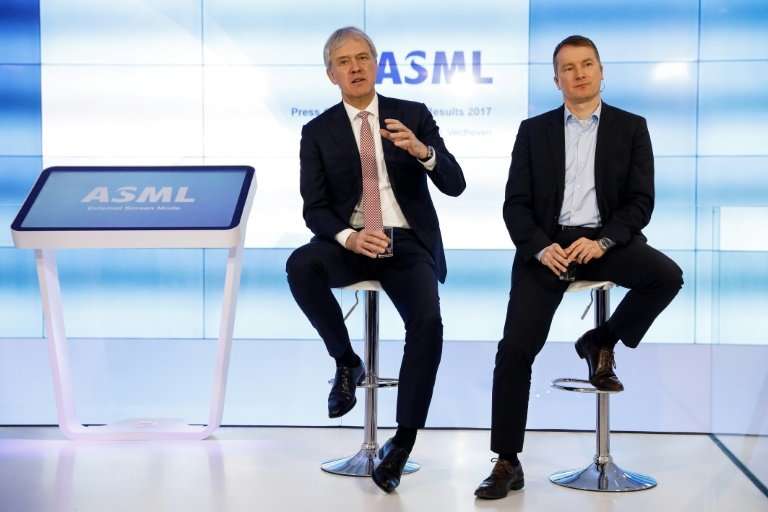CEO Peter Wennink (L) and CFO Wolfgang Nickl (R) of Dutch chip equipment manufacturer ASML attend the presentation of the annual figures of 2017.
Dutch computer chip maker and global hi-tech bellwether ASML Wednesday reported "a fantastic" 12 months with year-on-year profits almost doubling in 2017, sales on the increase and thousands of new jobs being created.
"ASML generated record sales and net income in 2017," said chief executive officer Peter Wennink.
Net profit soared by 44 percent to 2.12 billion euros ($2.6 billion) in 2017.
Sales also hit record highs, rising by a third to 9.05 billion euros.
"Overall a fantastic year," said Wennink from the company's headquarters in the southern Dutch town of Veldhoven.
ASML is one of the world's leading makers of lithography systems used by the semiconductor industry to make integrated circuits and microchips.
The company is considered a bellwether of the global high-tech industry as it supplies sector giants such as Samsung and Intel.
The lithography systems are used to manufacture processor chips, as well as memory chips such as DRAM and SRAM, essential for mobile phones and tablets.
"The semi-conductor industry is on fire," said Wennink, also predicting "extremely strong" demand in 2018 for "memory products."
Part of ASML's success comes from its sales of so-called extreme ultraviolet (EUV) machines which enable companies to produce smaller, more powerful and more rapid microprocessors.
"Due to industry strength, some customers requested earlier shipments of their lithography systems, which we were able to accommodate," Wennink said.
This helped the company to end the year on a strong fourth quarter, with net profits up 23 percent at 643 million euros.
EUV sales pushed past the billion-euro mark to 1.1 billion euros, making 2017 "the year in which preparations for inserting EUV into high-volume chip manufacturing shifted into a higher gear," said Wennink.
The company employs some 19,000 people in 16 countries, but demand has meant creating new jobs, with "thousands of vacancies worldwide", the Dutch public broadcaster NOS said.
Last year, some 100,000 people applied for about 2,500 jobs, around half of which were in The Netherlands. "The personnel office is running overtime," NOS added.
"The Dutch pool of technicians is fairly empty and not everyone has the right training," said Wennink, explaining why about 60 percent of new employees are foreigners.
© 2018 AFP



















